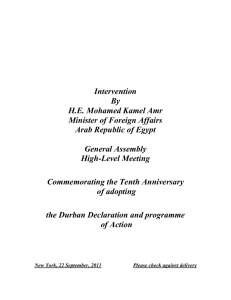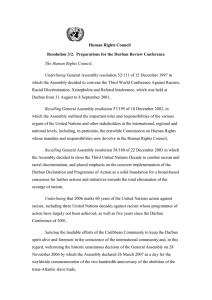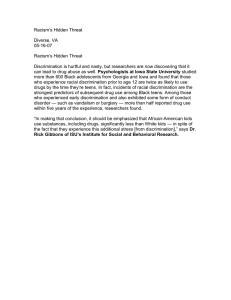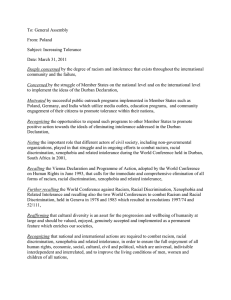A General Assembly United Nations Human Rights Council
advertisement
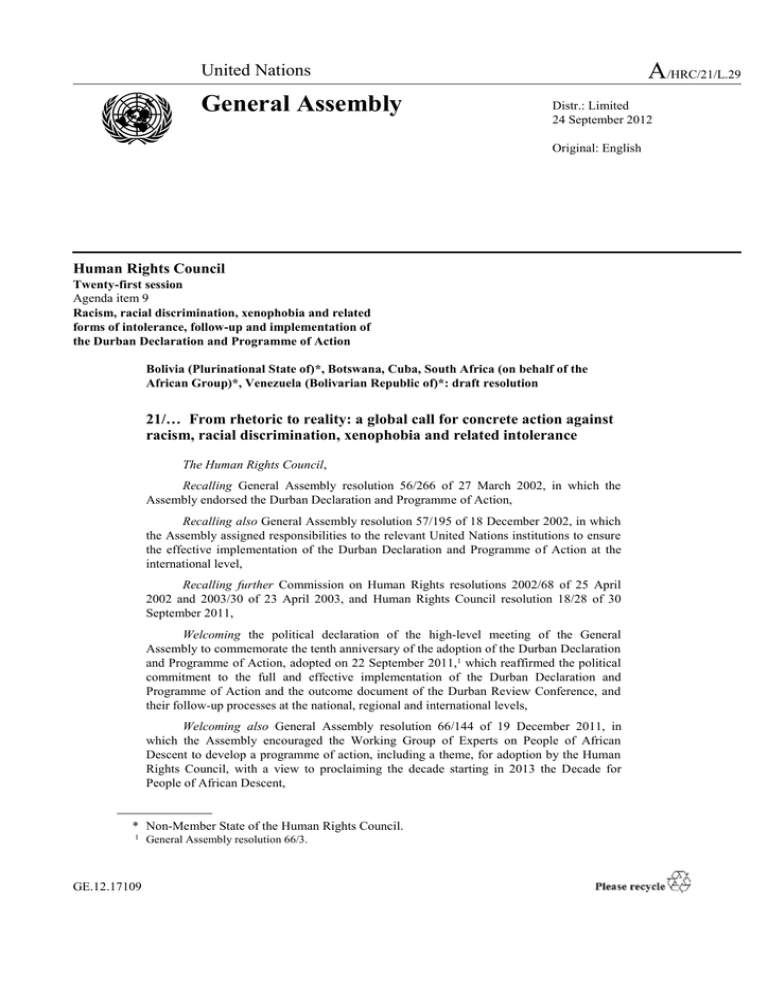
A/HRC/21/L.29 United Nations General Assembly Distr.: Limited 24 September 2012 Original: English Human Rights Council Twenty-first session Agenda item 9 Racism, racial discrimination, xenophobia and related forms of intolerance, follow-up and implementation of the Durban Declaration and Programme of Action Bolivia (Plurinational State of)*, Botswana, Cuba, South Africa (on behalf of the African Group)*, Venezuela (Bolivarian Republic of)*: draft resolution 21/… From rhetoric to reality: a global call for concrete action against racism, racial discrimination, xenophobia and related intolerance The Human Rights Council, Recalling General Assembly resolution 56/266 of 27 March 2002, in which the Assembly endorsed the Durban Declaration and Programme of Action, Recalling also General Assembly resolution 57/195 of 18 December 2002, in which the Assembly assigned responsibilities to the relevant United Nations institutions to ensure the effective implementation of the Durban Declaration and Programme of Action at the international level, Recalling further Commission on Human Rights resolutions 2002/68 of 25 April 2002 and 2003/30 of 23 April 2003, and Human Rights Council resolution 18/28 of 30 September 2011, Welcoming the political declaration of the high-level meeting of the General Assembly to commemorate the tenth anniversary of the adoption of the Durban Declaration and Programme of Action, adopted on 22 September 2011,1 which reaffirmed the political commitment to the full and effective implementation of the Durban Declaration and Programme of Action and the outcome document of the Durban Review Conference, and their follow-up processes at the national, regional and international levels, Welcoming also General Assembly resolution 66/144 of 19 December 2011, in which the Assembly encouraged the Working Group of Experts on People of African Descent to develop a programme of action, including a theme, for adoption by the Human Rights Council, with a view to proclaiming the decade starting in 2013 the Decade for People of African Descent, * Non-Member State of the Human Rights Council. 1 GE.12.17109 General Assembly resolution 66/3. A/HRC/21/L.29 Welcoming further the Declaration of the Global African Diaspora Summit, held in Sandton, Johannesburg, on 25 May 2012, Stressing the importance of a consistent global effort to correct ongoing distortion of the facts around the Durban Declaration and Programme of Action, Recognizing that poverty, underdevelopment, marginalization, social exclusion and economic disparities are closely associated with racism, racial discrimination, xenophobia and related intolerance and contribute to the persistence of racist attitudes and practices, which in turn generate more poverty, Expressing concern that the current economic and financial crisis and its consequences on poverty and unemployment may have further contributed to the rise of extremist political parties, movements and groups and exacerbated identity-related issues, and that in this period of economic crisis, non-citizens, members of minorities, migrants, refugees and asylum seekers are still the main scapegoat of extremist political parties that have a xenophobic and racist agenda and that sometimes incite racial discrimination and violence against them, Underlining the importance of removing legal obstacles and eliminating discriminatory practices that hamper some specific groups of individuals from fully participating in the public and political life of the countries they live in, including legal and practical obstacles such as discriminatory regulations regarding voter registration, the lack of identification documents, administrative and financial barriers, and discrimination in access to citizenship, Alarmed by the use of the Internet and social media by extremist groups and individuals to disseminate racist ideas and propagate racism, racial discrimination, xenophobia and related intolerance, Recognizing that the Internet and social media can also be a useful tool for preventing the spread of racist ideologies by extremist political parties, groups and movements, Deploring the use of print, audiovisual and electronic media, including the Internet, and any other means to incite acts of national, racial or religious violence, xenophobia or related intolerance and discrimination against any religion, as well as the targeting of religious symbols and venerated persons, Deeply concerned that despite the immense potential of sport in promoting tolerance, racism in sport is still a serious problem, Appreciating the contributions of the Durban follow-up mechanisms to the tenth anniversary commemorations, as well as the contributions of non-governmental organizations, which were broad-based, regionally balanced and consistent with the objectives of the commemoration, 1. Welcomes the efforts made by the Intergovernmental Working Group on the Effective Implementation of the Durban Declaration and Programme of Action in its constructive work aimed at the effective implementation of the Durban Declaration and Programme of Action, the outcome document of the Durban Review Conference and the political declaration of the high-level meeting of the General Assembly to commemorate the tenth anniversary of the Durban Declaration and Programme of Action, including by increasing efforts to complement the work of other Durban follow-up mechanisms with a view to achieving better coordination and synergy with other human rights mechanisms, thereby avoiding duplication of initiatives; 2 A/HRC/21/L.29 2. Takes note of the report of the Intergovernmental Working Group on the Effective Implementation of the Durban Declaration and Programme of Action;2 3. Decides that the Intergovernmental Working Group on the Effective Implementation of the Durban Declaration and Programme of Action should convene its eleventh session from 7 to 18 October 2013; 4. Recalls that preventing and combating racism, racial discrimination, xenophobia and related intolerance is a primary responsibility of States and, in this regard, recommends that States: (a) Develop and implement national plans of action to combat racism and racial discrimination, and to promote diversity, equality, equity, social justice, equality of opportunity and the participation of all; These plans should aim at creating conditions for all to participate effectively in decision-making and realize civil, cultural, economic, political and social rights in all spheres of life on the basis of non-discrimination; (b) Consider linking their development programmes and priorities for the improvement of the socioeconomic conditions of individuals and groups experiencing racial discrimination, social exclusion and marginalization, and that these linkages should be reflected in, inter alia, States’ reports for the universal periodic review mechanism of the Human Rights Council; (c) Invest in education as a tool for transforming attitudes and correcting ideas of racial hierarchies and superiority; (d) Collect ethnically disaggregated data with a view to setting up concrete targets and designing appropriate and effective anti-discrimination legislation, policies and programmes aimed at promoting equality and preventing and eliminating racism, racial discrimination, xenophobia and related intolerance; (e) Introduce into domestic criminal law a provision to the effect that the commission of an offence with racist or xenophobic motivation or aim constitutes an aggravating circumstance attracting heavier penalties and, in this connection, urges States to ensure that those responsible for crimes with racist or xenophobic motivation are prosecuted and adequately sanctioned, and that prompt, thorough and impartial investigations as a first step towards ensuring justice for the victims and fighting impunity are undertaken; 5. Emphasizes the importance of ensuring equality for all in the enjoyment of civil, cultural, economic, social and political rights, including the rights of minorities, without any discrimination based on race, colour, descent, national or ethnic origin as one effective way through which States may prevent and address the rise of tension and conflict; 6. Reiterates, particularly considering contemporary challenges in this area, the primacy of elaborating additional protocols to the International Convention on the Elimination of All Forms of Racial Discrimination, filling both procedural and substantive gaps with a view to maximum protection, adequate remedies and combating impunity for non-recurrence; 7. Welcomes the setting up of projects at the national level by civil society groups with the support of public authorities, including the creation of a social networkbased platform targeting young people and aiming specifically at countering right-wing extremism and fostering a democratic culture; 2 A/HRC/19/77. 3 A/HRC/21/L.29 8. Encourages States to use the opportunities provided by new technologies, including the Internet, to counter the dissemination of ideas based on racial superiority or hatred; 9. Deplores the use of print, audiovisual and electronic media, including the Internet, and any other means to incite acts of national, racial or religious violence, xenophobia or related intolerance and discrimination against any religion, as well as the targeting of religious symbols and venerated persons; 10. Calls on States to strengthen measures to prevent racist and xenophobic incidents in major sporting events, including by individuals or groups of individuals linked to extremist movements and groups; 11. Urges States, in cooperation with intergovernmental organizations, the International Olympic Committee and international and regional sports federations, to intensify the fight against racism in sport by, among other things, educating the youth of the world through sport practised without discrimination of any kind and in the Olympic spirit, which requires human understanding, tolerance, fair play and solidarity; 12. Welcomes and acknowledges the importance and significance of the work of the Working Group of Experts on People of African Descent in examining the current situation and conditions and the extent of racism against Africans and people of African descent and, in that regard, takes note with appreciation of the report of the Working Group,3 and endorses the draft Programme of Action for the Decade for People of African Descent contained in an addendum thereto,4 pursuant to General Assembly resolution 66/144 of 19 December 2011; 13. Decides to transmit the draft Programme of Action for the Decade for People of African Descent to the General Assembly for its consideration, with a view to its adoption, within the context of the International Decade for People of African Descent; 14. Strongly recommends to the General Assembly to proclaim the International Decade for People of African Descent starting from 2013, with the theme “People of African descent: recognition, justice and development”; 15. Recommends to the General Assembly to establish a United Nations permanent forum for people of African descent; 16. Calls for renewed efforts to mobilize political will for the full and effective implementation of the Durban Declaration and Programme of Action; 17. Requests the Secretary-General and the Office of the United Nations High Commissioner for Human Rights to fully implement paragraphs 53 and 57 of General Assembly resolution 65/240 of 24 December 2010 with respect to the establishment of an outreach programme and a public information campaign for the commemoration and its follow-up, including by distributing widely copies of the Durban Declaration and Programme of Action and translations thereof; 18. Encourages the High Commissioner to initiate consultations with various international sporting and other organizations, enabling them to contribute to the struggle against racism and racial discrimination; 19. Invites Member States, the United Nations system and all relevant stakeholders, including non-governmental organizations, to intensify their efforts for 3 4 4 A/HRC/21/60. A/HRC/21/60/Add.2. A/HRC/21/L.29 building support for the Durban Declaration and Programme of Action in the follow-up to the commemoration of the tenth anniversary thereof; 20. Decides to remain seized of this important issue. 5
